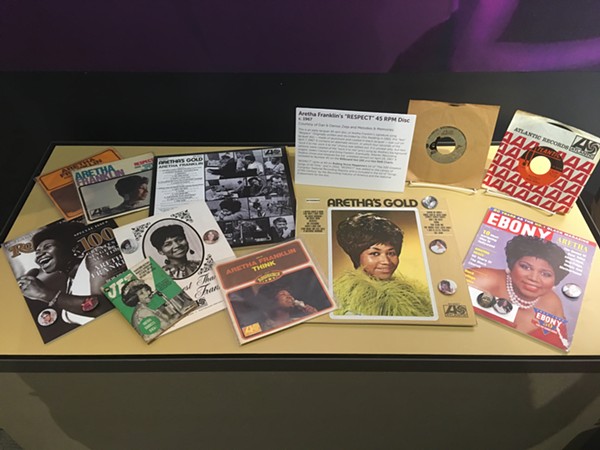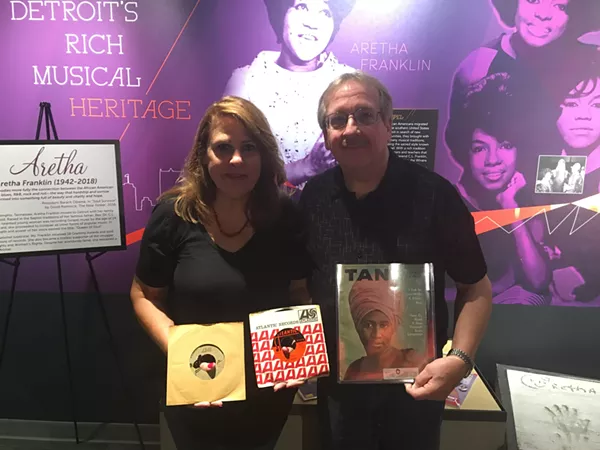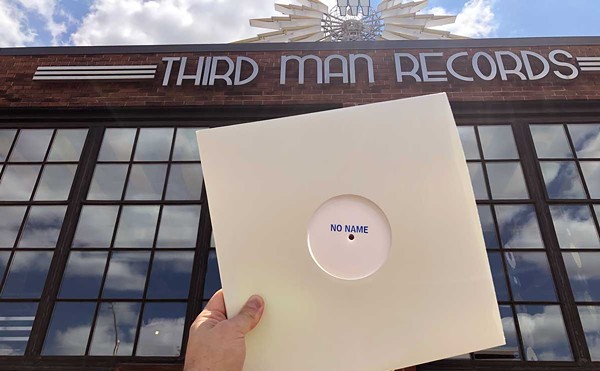
Lee DeVito
Aretha Franklin memorabilia on display at the Detroit Historical Museum, including a rare "Respect" test pressing.
The day before Aretha Franklin died earlier this month, owners of Eastpointe record store Melodies and Memories, Dan and Denise Zieja, bought boxes of records from a collector — approximately 1,000 45's in total. Denise says it isn't that unusual in the record store business for a collector to bring in a haul that big, but what was unusual was one of the records in the collection: a rare test pressing of Franklin's 1967 hit "Respect."
Due to the timing of the acquisition, as well as its historical significance in pop music, Denise Zieja believes it could be one of the most prized records in the world.
"This is world-renowned," Zieja says. "It's one of the biggest songs of all time."
But more important than its monetary value, Zieja says, is the story it tells.
The song was originally written and sung by Otis Redding in 1965. "But when he did it, it was more of a male version, and singing that he wanted respect from his woman," Zieja says.
A lot had changed in the world in the two years since Redding's version, as the civil rights and feminist movements gained steam in the '60s. Franklin recorded her version on Valentine's Day, 1967. The test pressing was cut on April 7, 1967, and the final song was released on April 29 of that year. "In '67 we had the riots, and there was a lot of issues," Zieja says. "So when [Franklin] did it, it was more of a civil rights and women's rights anthem."
Aside from the gender swap, Franklin took some other liberties that inarguably improved the song, making it catchier and more iconic. And those changes reportedly came from Franklin and her sisters Carolyn and Erma, who sang backup vocals on the track.
Notably, Redding's version did not have the iconic chorus with "R-E-S-P-E-C-T" spelled out, which was reportedly Carolyn's idea.
"Carolyn and Aretha were talking about the song and they were thinking about it, and Carolyn said, 'Why don't you spell out 'respect?'" Zieja says. "So that's how that came about."
Another change the Franklin sisters made can be seen in the difference between the test pressing and the final version. The test pressing is four seconds shorter; it does not feature the "sock it to me" backup vocals that were added to the final version. Carolyn and Erma reportedly came up with the idea to sing the line, as it was a popular saying at the time.
Those changes helped rocket the song to the No. 1 spot on the Billboard Hot 100. Franklin was the first woman inducted into the Rock & Roll Hall of Fame in 1987, and Rolling Stone ranked the song as No. 5 among the "500 Greatest Songs of All Time" in 2011.

Lee DeVito
Denise and Dan Zieja have loaned boxes of Aretha Franklin memorabilia to the Detroit Historical Museum. Denise holds the "Respect" test pressing in her right hand, and the final version in her left.
The "Respect" find is the latest in a whirlwind year for the Ziejas, who have been in business for more than three decades. In February, the Ziejas sold a rare copy of Frank Wilson's 1965 soul song "Do I Love You (Indeed I Do)," then considered the rarest 45 in the world. The buyer was rock star Jack White, who bought the record for an undisclosed price (Zieja says its the highest price that has ever been paid for a 45, approaching six figures), and later re-released it on his label, Third Man Records. Zieja believes the "Respect" test pressing could be worth even more.
Zieja says she plans on selling the record but doesn't want to do anything right now while Franklin's death is still being mourned. (The singer's funeral is on Friday.) "I don't want to do anything that would go against the Franklin family right now," she says. "I want whatever we do to be in their best interest."
For now, the record will be on display at the Detroit Historical Museum, along with a trove of Franklin memorabilia the Ziejas have loaned, including magazines and fliers. The museum says it is planning a larger Franklin exhibition in October.
Zieja says it's important that the record is on view in the Motor City.
"Aretha was Detroit," she says. "She was a champion of Detroit. She loved her city. She stayed here and lived here. I think the record means so much more to the city because of her singing it."
Stay on top of Detroit news and views. Sign up for our weekly issue newsletter delivered each Wednesday.






